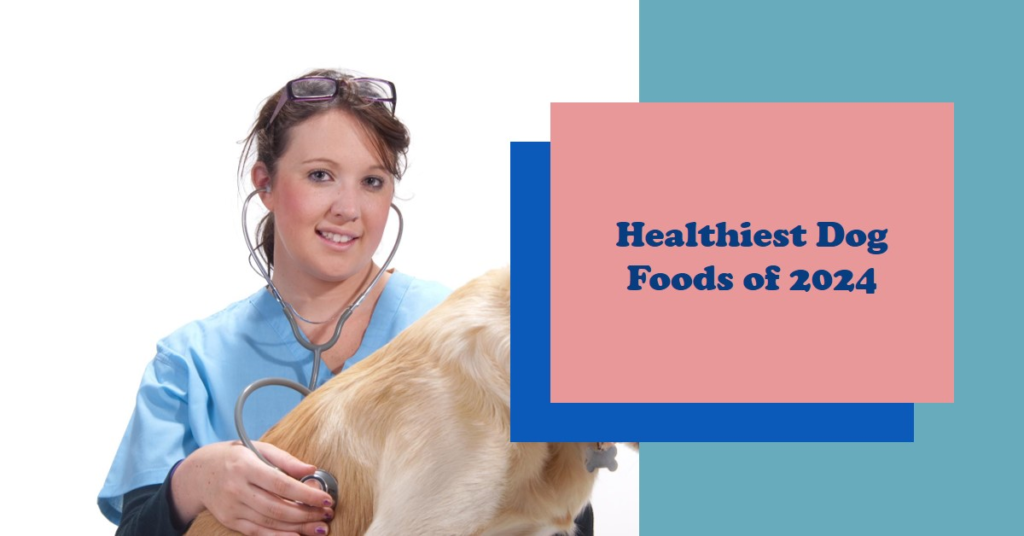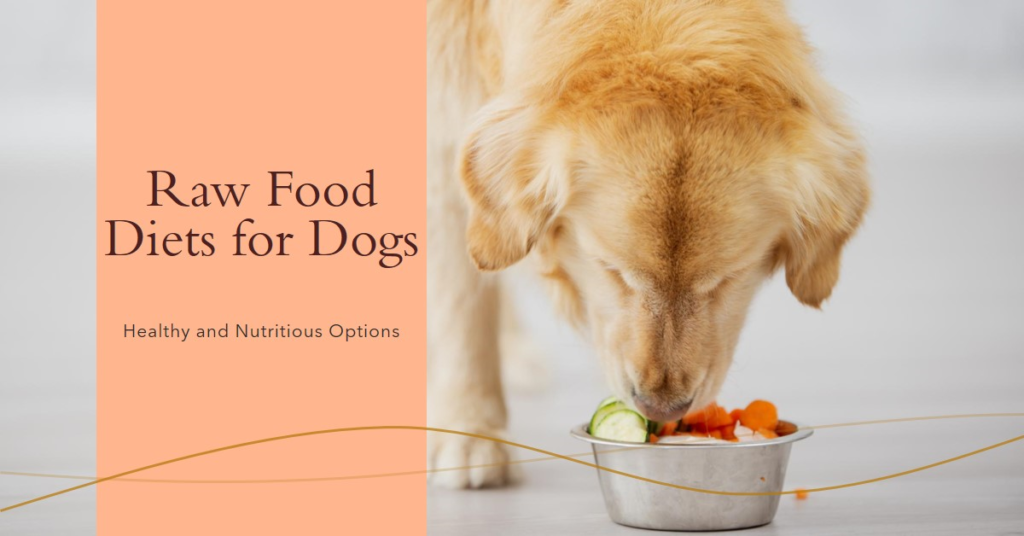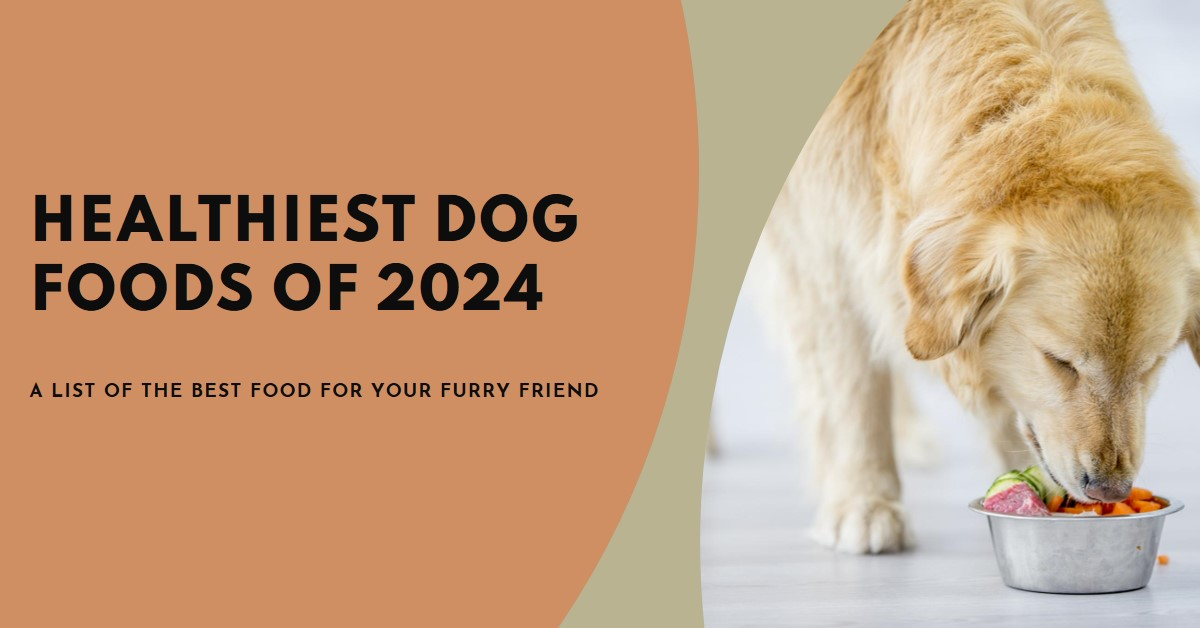Dog’s health and well-being greatly depend on the food they eat. Dog owners need to be well informed about the nutritional value and ingredients of different dog foods available in the market.
This article will discuss the list of healthiest dog foods of 2024. It will examine these foods’ ingredients, nutritional profiles, and benefits. The aim is to help dog parents make informed choices to ensure their furry companions get optimum nourishment for a fit and active life.
List of Healthiest Dog Foods

The Top Dry Dog Foods
Dry kibble makes for a convenient daily meal for dogs. Some of the top dry foods for dog health are Orijen, Acana, Holistic Select, and Wellness CORE. These foods use high-quality animal protein as the main ingredient and do not contain corn, wheat, or soy, which some dogs may have sensitivity to. They are also free from artificial preservatives and colors. Being rich in nutrients from meat, fish, and eggs, these foods promote strong muscle growth, a glossy coat, and overall vitality in dogs.
Grain-Free Dry Foods
Many dogs do not need grains; avoiding them can be better for some. Some excellent grain-free dry foods are Nature’s Variety Instinct, Fromm Four-Star Nutritionals, and Champion Pet foods.
These foods have meat, poultry, or fish as the predominant source of protein and provide complete nutrition from alternative carbohydrate sources like sweet potatoes, peas, and lentils. Going grain-free prevents issues like skin allergies, ear infections, and gastrointestinal distress in dogs prone to grain sensitivities. It also supports lean muscle mass and shiny fur or coat.
Canned Wet Dog Food
As canned foods contain 70-80% moisture, they are more digestible than kibble for dogs and especially suitable for older canines or those with dental or digestive issues. Some top-rated canned foods are I and Love and You, Weruva, and Whole-Hearted.
They contain high-quality protein from proteins like salmon, beef, chicken, or lamb as the primary ingredient and vegetables. Being softer and more palatable, canned foods encourage higher water intake in dogs. They also contain fewer carbs than dry kibble, which is better for overweight or diabetic dogs. The extra moisture keeps dogs hydrated.
Raw Food Diets

Feeding dogs a diet of uncooked meat, bones, organs, and fruits/vegetables mimics their natural ancestral diet and provides optimum nutrition. Though requiring more effort for owners, a balanced homemade raw food diet or commercially prepared raw diet from brands like Primal, Nature’s Variety, and Steve’s Real Food can keep dogs very healthy.
Raw food retains maximum vitamins, minerals, and enzymes destroyed in cooking. It supports strong digestion, a shinier coat, and reduced veterinary visits. Some dogs also see relief from skin or ear conditions from eating raw food.
Fish-Based Diets
Fish is highly nutritious for dogs, containing essential omega fatty acids and high-quality protein. A fish-based diet helps maintain a dog’s coat and skin health.
Some great options are brands like Merrick Backcountry, High Prairie, and Wellness Complete Health Small Breed adult formulas, which have fish, notably salmon, as the major source of protein. The omega-3s from fish also benefit dogs’ joint health and brain development. It keeps dogs energized and their immune systems robust.
Grain-Inclusive Diets
While grain-free diets suit many dogs, some may still do well with moderate amounts of whole grains in their food. Budget-friendly options are Hill’s Science Diet, Iams, and Eukanuba, with brown rice, oats, or barley as secondary ingredients after meat. These ensure energy needs are met and promote regular digestive health in dogs. They also contain prebiotics and probiotics, supporting a balanced gut microbiome. Some dogs may prefer these formulations to strictly grain-free varieties.
Homemade Diets
For owners wanting complete control, homemade dog diets under the guidance of a canine nutritionist are an option. The basic homemade diet would include protein sources like chicken, eggs, and fish, carbohydrates from vegetables, and moderate complex carbs.
The key is balancing macros and micros. Homemade ensures no preservatives or fillers and caters to any allergies. Though requiring preparation time, it suits dogs with sensitivities. The proper vitamin-mineral supplement is needed for balance. Fresh ingredients, in the right proportion, followed regularly, are healthy for dogs.
Senior Dog Diets
As dogs age, their nutritional needs change with falling activity levels and metabolism. Senior dog foods are formulated to meet these special needs. Hill’s Science Diet, Royal Canin, and Purina Pro Plan have senior-focused foods with easily digestible proteins, fats, antioxidants, and nutrients supporting joint health.
Senior foods require less fiber, calories, phosphorus, and magnesium, while upping omega-3s benefits senior dogs. They come in small kibble sizes, are easier on older jaws, and keep elderly pups feeling energetic and healthy into their golden years.
Puppies Diets
Unlike adults, a puppy’s growth and development require a balanced diet tailored to their needs. High-quality puppy foods foster rapid bone and muscle growth, benefiting long-term health.
Options are Hill’s Science Diet, Royal Canin, Purina, and Eagle Pack Holistic, providing the optimal balance of protein, fat, vitamins, and minerals. Calcium and phosphorus promote strong teeth and bones, while DHA supports brain development. Protein sources are lean but highly bioavailable. The right nutrition from these specialized formulations ensures optimum growth into adulthood.
Healthiest Dog Foods of 2024
| Brand |
|---|
| Blue Buffalo |
| Orijen |
| Taste of the Wild |
| Wellness Core |
| Merrick |
| Instinct |
| Canidae |
| Acana |
| Natural Balance |
| Nutro |
| Fromm |
| Earthborn Holistic |
| Royal Canin |
| Nulo |
| Zignature |
| Stella & Chewy’s |
| Iams |
| Purina Pro Plan |
| Hill’s Science Diet |
| Victor |
| Solid Gold |
| Rachael Ray Nutrish |
| Diamond Naturals |
| 4health |
| Eukanuba |
| Holistic Select |
| Castor & Pollux |
| Wellness Complete |
| Farmina |
| Evolve |
Wrap Up
Feeding dogs the most suitable and nutritious food is essential to their well-being. While generic grocery store foods may be cheaper, a dog’s health and quality of life are ultimately priceless. Specialized commercial pet foods from reputed brands offer balanced and complete nutrition catering to a dog’s stage of life, whether puppy, adult, or senior. But it’s also important that dog parents thoroughly research ingredients and nutritional profiles to pick what best suits their furry family member. Homemade cooked or raw diets can also work well if carefully planned.
Frequently Asked Questions (FAQs)
Q 1: What protein source is best for dogs?
Ans 1: Animal proteins like chicken, fish, beef, and lamb are ideal and closely match a dog’s natural diet. They provide high-quality protein and important vitamins/minerals. Dogs can easily digest meat proteins and benefit from the amino acids. Fish, especially fatty fish, offer an extra boost from omega-3 fatty acids.
Q.2: Is grain-free better for my dog?
Ans 2: Though some dogs do fine with grains, others may have sensitivities, making grain-free preferable. Being grain-free ensures less risk of digestive upset, itchy skin, or ear infections for those dogs. However, if your dog shows no issues with grains, an option with moderate whole grains is also suitable. Consult your vet based on your dog’s profile.
Q.3: Can I feed my dog human leftovers?
Ans 3: While an occasional small bite of human food won’t harm, making leftovers a staple is not advisable. Our food often contains added salt, sugar, spices, or unhealthy fats that are unsuitable in large amounts for dogs. It also lacks balanced nutrition. Stick to your dog’s diet to ensure they get all critical health and illness protection nutrients.
Q.4: Should I home-cook or feed kibble to my dog?
Ans 4: Either option can suit dogs based on the diet’s balance. A home-cooked diet needs careful research. Kibble provides complete nutrition but checks quality. Fresh human-grade ingredients in balanced proportions, tailored with oversight by a canine nutritionist, suit some dogs well, like those with allergies. Consult your vet to pick what works for your dog best.
Also Read:


